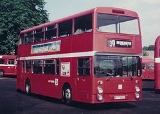
Foden-NC
Encyclopedia
The Foden-NC was an unsuccessful design of double-decker bus
built by Foden of Sandbach and Northern Counties of Wigan in the United Kingdom between 1975 and 1978.
onto chassis
produced by other companies. At the time of the design's conception, British Leyland had by far the largest share of the market for double-decker buses in the UK, with its Atlantean
, Fleetline
and Bristol VR
models. The Foden-NC was intended to compete against these for a share of this market.
The transmission proved to be a weakness, with the Foden transfer box being prone to failures and the Allison gearbox inefficient. Derby City Transport retrofitted a Voith transmission in its Foden-NC in an attempt to overcome the problems.
In appearance, the Northern Counties bodywork was very similar to the style built on other chassis (Atlanteans and Fleetlines).
instead of Northern Counties. An eighth partially completed bus was used for testing.
The vehicles went to the following operators:
Most of the vehicles experienced shorter than average working lives, although two of them (TUB 250R and ROC 300R) still exist, preserved in the care of Aintree Coachline of Liverpool.
Double-decker bus
A double-decker bus is a bus that has two storeys or 'decks'. Global usage of this type of bus is more common in outer touring than in its intra-urban transportion role. Double-decker buses are also commonly found in certain parts of Europe, Asia, and former British colonies and protectorates...
built by Foden of Sandbach and Northern Counties of Wigan in the United Kingdom between 1975 and 1978.
Background
Foden was primarily a truck manufacturer, although it had also built bus chassis in the past, whilst Northern Counties was a bus body manufacturer, building bodyworkCoachwork
Coachwork is the body of a horse-drawn coach or carriage, a motor vehicle , a railroad car or railway carriage. Usually reserved for bodies built on a separate chassis, rather than being of unitary or monocoque construction...
onto chassis
Chassis
A chassis consists of an internal framework that supports a man-made object. It is analogous to an animal's skeleton. An example of a chassis is the underpart of a motor vehicle, consisting of the frame with the wheels and machinery.- Vehicles :In the case of vehicles, the term chassis means the...
produced by other companies. At the time of the design's conception, British Leyland had by far the largest share of the market for double-decker buses in the UK, with its Atlantean
Leyland Atlantean
The Leyland Atlantean is a model of double-decker bus built by Leyland in the United Kingdom from 1958 to 1986....
, Fleetline
Daimler Fleetline
The Daimler Fleetline is a rear-engined double-decker bus chassis built between 1960 and 1973 in Coventry, Warwickshire, England, and from 1973 until 1980 in Farington, Lancashire, England. However, the last complete vehicle did not enter service until 1983...
and Bristol VR
Bristol VR
The Bristol VR was Bristol's rear-engined bus chassis, designed as a competitor to the Leyland Atlantean and Daimler Fleetline.-Development:...
models. The Foden-NC was intended to compete against these for a share of this market.
Design
The Foden-NC was a semi-integral design, meaning that it has an underframe (chassis), but that the bodywork is also structurally load-bearing.The transmission proved to be a weakness, with the Foden transfer box being prone to failures and the Allison gearbox inefficient. Derby City Transport retrofitted a Voith transmission in its Foden-NC in an attempt to overcome the problems.
In appearance, the Northern Counties bodywork was very similar to the style built on other chassis (Atlanteans and Fleetlines).
Production
Only seven vehicles were completed, one of which carried bodywork built by East LancsEast Lancashire Coachbuilders
East Lancashire Coachbuilders Limited was a manufacturer of bus bodies and carriages founded in 1934 in Blackburn, Lancashire, England.In 1994 the company expanded in to new premises and commenced a programme of development that resulted in a range of single and double deck buses which was the...
instead of Northern Counties. An eighth partially completed bus was used for testing.
The vehicles went to the following operators:
- Greater Manchester PTE - two, registered LNA 258P and PNE 358R, numbered 1435 and 1436
- West Yorkshire PTE - one, registered TUB 250R, numbered 7250
- West Midlands PTE - one, registered ROC 300R, numbered 6300
- South Yorkshire PTE - one (with East Lancs body), registered SWG 311S, numbered 511
- Derby City Transport - one, registered WTO 101S, numbered 101
- Potteries Motor Traction - one, registered WVT 900S, numbered 900
Most of the vehicles experienced shorter than average working lives, although two of them (TUB 250R and ROC 300R) still exist, preserved in the care of Aintree Coachline of Liverpool.
External links
- The Experimental Northern Counties Bodied Fodens – SELNEC (South East Lancashire/North East Cheshire) Preservation Society

